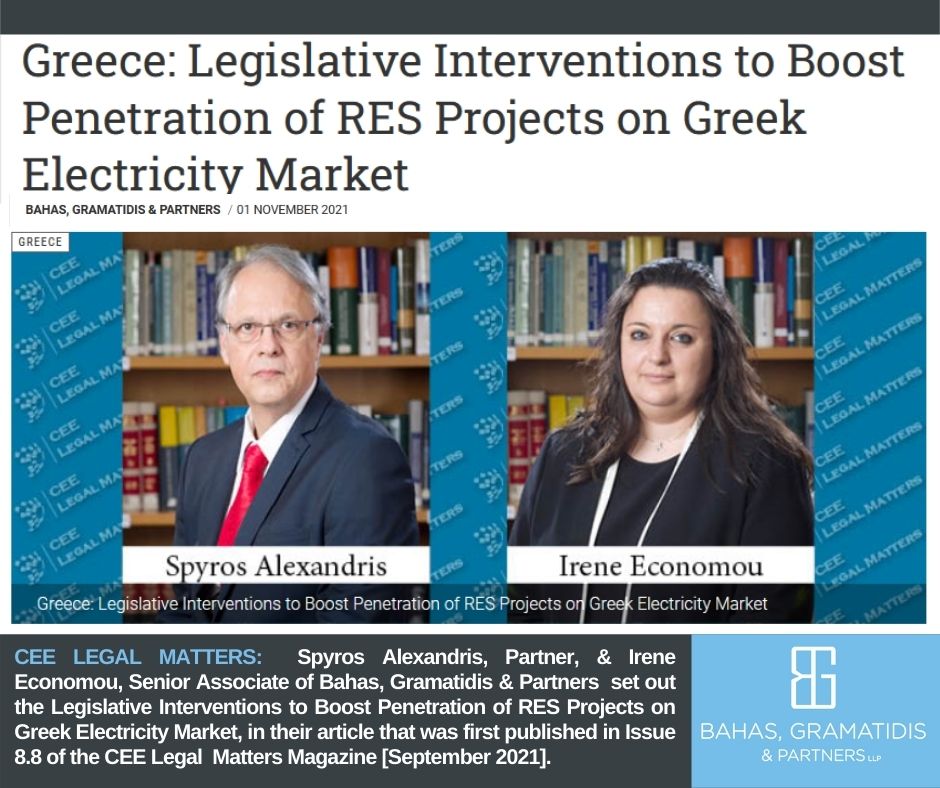Legislative Interventions to Boost Penetration of RES Projects on Greek Electricity Market
CEE Legal Matters Magazine: Spyros Alexandris, Partner, & Irene Economou, Senior Associate of Bahas, Gramatidis & Partners set out the Legislative Interventions to Boost Penetration of RES Projects on Greek Electricity Market.
The end of 2020 saw landmark legislative interventions in Greece, mainly aiming to create the prerequisites for the widest possible adoption of the EU Target Model (the creation of a single EU energy market) and boost the penetration of renewable energy sources, in a regulated and rational way. According to the government, these interventions “establish the framework for a more rational operation of the sector, on more competitive terms, to the benefit of the consumers and of the Greek economy in general.”
In particular, Law 4685/2020 has transposed into Greek national law European Directives 2018/844 and 2019/692, updating and streamlining environmental licensing procedures for RES projects, while Law 4579/2020 has amended the Greek Law on Strategic Investments, providing a fast-track licensing procedure for RES power generation plants. These may now be qualified as strategic investments and claim grid connection priority if they meet certain criteria, including: (1) being innovative applications and technologies projects; (2) having a budget of at least EUR 50 million; and (3) having a connection point to the National Electric Power Transmission System.
Innovative projects, within the scope of this law, are those using any of the following technologies: electric power storage systems, green hydrogen production, offshore wind farms and floating photovoltaic farms, RES projects connecting areas of the national territory to the NEPTS through an undersea cable, fully regulated renewable electricity production projects (using biomass, biogas, geothermal stations, and solar thermal stations), and RES hybrid projects on non-interconnected islands.
Projects would qualify as innovative and gain strategic investment status through a request by the investor to Enterprise Greece SA, a state-owned company. The actual qualification of the project as innovative is issued by the Ministry for the Environment and Energy, within five days of receiving the related request from Enterprise Greece. It is estimated that each licensing step will be completed within 45 days of the relevant dossier’s submission, with the Environmental Terms Approval Decision to be issued within 30 working days. The complete licensing procedure is expected to last three years.
Additionally, non-innovative RES projects with a budget of at least EUR 100 million may become strategic investments, without being able to claim grid priority.
The above changes came at a time when domestic and foreign investment interest for onshore RES projects in Greece had grown tremendously. While the Greek National Plan on Energy and Climate aimed for RES stations with a capacity of 19 gigawatts by 2030, that target was surpassed four times over, with applications for a total capacity of 75 gigawatts having been submitted. The Government also announced it expects new regulations regarding offshore wind farms to enter into force by December 2021. Offshore wind has a huge investment appeal, with Greece placing third among EU states (including the UK) in the ranking of available offshore wind potential, with an estimated 263 gigawatts.
To date, the Greek Government has granted only two licenses for offshore wind farms, both in 2007. Floating offshore wind farms, in particular, are currently the focus of investor interest since bottom-fixed ones are harder to develop, due to the deep waters of the Greek Seas. The Greek Ministry for the Environment and Energy intends to implement, by 2022, a program for the delimitation of special offshore planning. Interventions in the fields of navigation, fishing, environmental protection measures, and others are expected, all needed to ensure that licensing and implementation of the relevant investments occur in a framework of legal certainty.
According to the announcements of the competent department within the Ministry for the Environment, the global regulation of offshore wind farms, as elaborated by the Greek Government, shall take into consideration the report regarding the European Strategy on the issue of offshore RES. The global regulation shall be based on three axes: siting and licensing regulation, terms of interconnection to the Continental Electricity System, and definition of the way in which the relevant investments will be compensated.
This Article was originally published in Issue 8.8 of the CEE Legal Matters Magazine [September 2021].
website-CEELM-SEPT21-SAEE-ARTICLE-PDF
